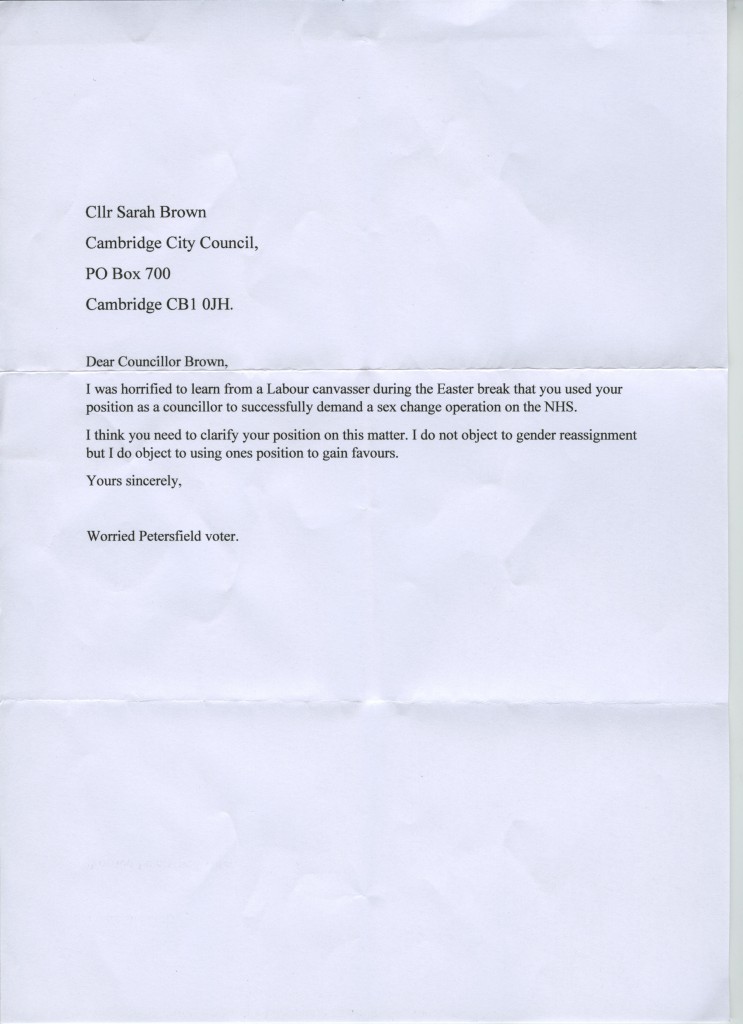My attention was drawn this morning to this open letter in the Guardian/Observer/Whatever signed by a long list of notable transphobes and whorephobes, and a few people who really should know better. “We cannot allow censorship and silencing of individuals”, it says.
It goes on to describe a number of examples of this “censorship and silencing”. They are:
- The cancellation of Kate Smuthwaite’s gig at Goldsmith’s College last month.
There was, it is claimed, “intimidation” over this show, which caused it to be cancelled. However, the organiser of the very same show paints a rather different picture, one where they only sold 8 tickets, where the only suggestions of a picket or protests appear to have been manufactured by Ms Smurthwaite herself (possibly in a misguided attempt to generate some controversy and sell some tickets?)
This is all because Kate has curated a reputation of being a sex work abolitionist, and tends to be quite abrasive towards sex workers who take the view that they’d like to continue their livelihood in safety, without someone trying to coercively “rescue” them, than you very much.
The show was cancelled because nobody bought tickets, for whatever reason, but in the two weeks since, the student volunteers who run Goldsmith’s SU and their comedy society have been the targets of some abuse as a result.
@RozKaveney @commentisfree Goldsmiths SU did not no platform Kate Smurthwaite. We have no policy. Whole preamble false
— Howard (@howardsaid) February 14, 2015
@RozKaveney @commentisfree @NickCohen4 thinking about it. We are small SU mostly student volunteers (including comedy soc president)…
— Howard (@howardsaid) February 14, 2015
@RozKaveney @commentisfree @NickCohen4 ..who have had had all sorts of hate&smears directed at us for past 2 weeks over a show cancellation
— Howard (@howardsaid) February 14, 2015
It sounds like someone is being silenced and intimidated here, but I don’t think it’s Kate Smurthwaite.
- Calls at the Cambridge Union to withdraw a speaking invitation to Germaine Greer.
I actually know something about this one, because I was involved. The Union Society (an expensive bit of prime real estate in Cambridge City Centre with a debating society attached, known for being somewhere were aspiring political hacks cut their teeth, and not to be mistaken with Cambridge University Students’ Union) did indeed invite Germaine Greer to speak.Greer has a long history of transphobic bigotry, and managed to fire herself as a Cambridge lecturer over it. the Students’ Union LGBT+ society, who had a partnership with the Union Society for their weekly socials, felt this was a bit off and wrote to the Union Society outlining their concerns.
The Union Society noted their concerns by way of reply, and said they would go ahead anyway. In response, the LGBT+ Society and the Women’s Society organised a separate event featuring noted trans feminist writer, Roz Kaveney, at which I also spoke. A couple of students also handed out some leaflets to those going to the Union Society’s Greer event.
That’s not “silencing” and it’s certainly not “intimidation”. I saw the whole email chain between CUSU LGBT+ and the Union Society. It was all terribly polite and respectful, but the two sides did disagree. That’s ok, that’s allowed.
The expression of disagreement is a fundamental part of freedom of expression. Shame on the letter signatories for trying to silence it.
- Rupert Reed, the Green Party Prospective Parliamentary Candidate for Cambridge, recently got into something of a kerfuffle over comments he made in a blog and on twitter, initially about the use of the word, “cisgender”, but later compounded in a clumsy apology where he shot himself in the foot by suggesting there was a debate to be had about whether trans women should be allowed to use public toilets.
All that I have done is join many feminists in saying that it is up to women, not anyone else – and certainly not me – to decide who gets let into women-only spaces, such as women’s toilets. All women have a right to be involved in making those decisions.
Reed apologised again, properly this time. I understand some LGBT people in Cambridge who wanted to vote Green wrote to the local party saying they didn’t think they could while Reed was their candidate and … that’s it.
The letter to the Guardian says, “The Green party came under pressure to repudiate the philosophy lecturer Rupert Read after he questioned the arguments put forward by some trans-activists”, but those “arguments put forward by trans activists” are basically just, “can we use the toilet, please?”
Regardless, telling a politician that you thought something they said was out of order, and you’re not going to vote for them as a result, is not “silencing” and it’s not “intimidation”. What it actually is is democracy. Shame on the letter signatories for opposing it.
- Julie Bindel is no platformed by the NUS LGBT.
No platforming sounds terribly serious. In reality, it basically means, “we won’t invite this person to our stuff, and we won’t appear on the same platform as them.”
Given Bindel is known for her transphobia and has spoken publicly in support of trans conversion therapy (remember Leelah Alcorn?), it’s hardly surprising that the NUS LGBT don’t want anything to do with her. The thing is, people are allowed to take their ball and go home, and they are allowed to express opinions about public figures and even protest about them. These are fundamental parts of freedom of expression, and not in any way an attack on it.
Some people around the world are actually oppressed because of the things they want to say. They’re not comedians engaging in publicity stunts, washed up academics getting invited to plush debating societies, politicians getting caught saying something stupid or transphobes with more newspaper columns than I can reasonably count. By signing this letter, you do a disservice to those who are actually denied freedom of expression around the world. Shame on you.
Those who signed and have a history of transphobia and whorephobia know what they’re doing and are being deeply cynical here.
To those who signed it because they were told it was about “freedom of speech” and didn’t research the context, I merely ask to please try to be a bit less credulous in future.
Oh, and maybe try to be a bit less “first world problems” about healthy disagreement, ok?
Thanks.



